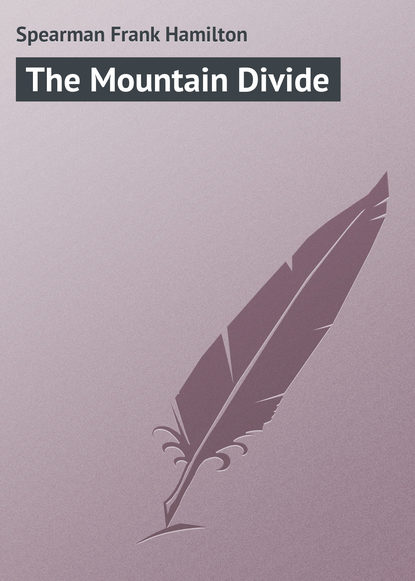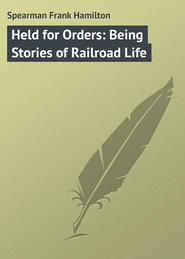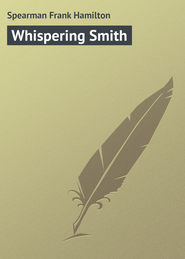По всем вопросам обращайтесь на: info@litportal.ru
(©) 2003-2024.
✖
The Mountain Divide
Автор
Год написания книги
2017
Настройки чтения
Размер шрифта
Высота строк
Поля
Fast as they came, time was given for word to the sheriff, who conveniently got out of the way, and, led by half a dozen men with crowbars and spike-mauls, the outlaws surrounded and overran the jail yard and without a show of resistance from any one began smashing in the entrance and battering down the cell doors.
The first suggestion included only the delivery of the two men. But this was effected so easily that more was undertaken. The jail at Medicine Bend, being the only one within many miles in any direction, harbored the criminals of the whole mountain region, and these now cried to friendly ears for their own freedom. Cell after cell was battered open and the released criminals, snatching tools from the mob, led in the fight to free their fellows. In less than half an hour every cell had been emptied and a score of hardened malefactors had been added to the mob, which now proposed to celebrate the success of its undertaking by setting fire to the jail itself.
The vigilantes down town, though taking the alarm, had moved too slowly. A jail delivery meant, they knew, that their stores would be looted, and, under the leadership of Atkinson, they attempted to avert the mischief impending.
Gathering twenty-five determined men, they started with a shout for the hill, only to see the sky already lighting with the flames of the burning building. The mob, not understanding at first, welcomed the new-comers with a roar of approval.
But they were soon undeceived. The vigilantes began to try to save the jail and their efforts brought about the first clash of a night destined long to be remembered in Medicine Bend. The brawlers in the crowd stayed to fight the vigilantes. The thieves and night-birds fell away in the darkness, and like black cats scurried down town to pillage the stores and warehouses of the fire-fighters on the hill.
The few clerks and watchmen defending the stores, these knaves made short work of. Dancing and Scott, with Stanley, Bucks, and a party of railroad men, uneasy at the reports from the jail and now able to see the sky reddening with the flames, moved in and out of the gloom of side streets to keep track of the alarming situation and were the earliest to discover the looting movement.
A convenient general store at Front and Hill Streets was the first to be pillaged. Dancing wanted to lead a party against the looters, but Stanley pointed out the folly of half a dozen men trying to police the whole street.
“We can do nothing here, Bill. Those vigilantes have no business on the hill. Get word to them, if you can, that the stores are being robbed. They can’t save the jail; they ought to come back and save their own property. I can’t bring men up from the roundhouse. We’ve got to protect our own property first. If we could get word to them–but a man never could get through that mob to the jail.”
“I reckon I can, colonel,” said Bill Dancing, throwing off his coat.
“They will kill you, Bill,” predicted Stanley.
“No,” growled the lineman, rolling up his shirt sleeves. “Not me. I wouldn’t stand for it.”
CHAPTER XXI
Slipping away behind the long warehouses in Front Street and moving swiftly in and out of friendly shadows on his long journey up the hill, Dancing started for the jail. He was hardly more than well under way when he was aware of one following him and, turning to fell him with his fist, he started as he found it was Bucks.
The latter confronted him coolly: “Go ahead, Bill; I am going with you.”
“Who said you could go?” exclaimed the lineman. “You can’t. Go back!”
Bucks stood his ground.
“Do you want to get killed?” thundered Dancing hotly.
“Two are better than one on a job like this,” returned Bucks, without giving way. “Go on, will you?”
With a volley of grumbling objections, Dancing at length directed Bucks to stick close to him, whatever happened, and to fight the best he could in case they were cornered.
Ahead of them the glare of the conflagration lighted the sky and the air was filled with the shouts of the mob surrounding the fighting vigilantes. Only half a block away, men were hurrying up and down Front Street, while the two clambered along the obscure and half-opened street leading to the jail and parallel to the main thoroughfare.
Dancing, to whom every foot of the rocky way was familiar and who could get over obstructions in the dark as well as if it were day, led the way with a celerity that kept his companion breathing fast. Both had long legs, but Dancing in some mysterious way planted his feet with marvellous certainty of effect, while Bucks slipped and floundered over rocks and brush piles and across gullies until they took a short cut through a residence yard and found themselves on the heels of the mob surrounding the burning jail and in the glare of the fire in upper Front Street.
“Stick close, sonny,” muttered the lineman, “we must push through these fellows before they reco’nize us.”
He stooped as he spoke and picked up a piece of hickory–the broken handle of a spike-maul. “Railroad property anyway,” he muttered. “It might come handy. But gum shoes for us now till we are forced. Perhaps we can sneak all the way through.”
Without further ado Dancing, with Bucks on his heels, elbowed his way into the crowd. The outer fringe of this he knew was not dangerous, being made up chiefly of onlookers. But in another minute the two were in the midst of a yelling, swaying mix-up between the aggressive mob and a thin fringe of vigilantes, who, hard-pressed, had abandoned the jail to its fate and were trying to fight their way down town.
Dancing, like a war-horse made suddenly mad by smoke of battle, throwing caution and strategy to the winds, suddenly released a yell and began to lay about him. His appearance in the fray was like that of a bombshell timed to explode in its midst. The slugging gamblers turned in astonishment on the new fighting man, but they were not long left in doubt as to which cause he espoused. In the next instant they were actively dodging his flashing club, and the vigilantes encouraged as if by an angel fought with fresh vigor.
Bucks was stunned by the suddenness of Bill’s change of tactics. It was evident that he had completely forgotten his mission and now meant to enjoy himself in the unequal fray that he had burst in upon. The vigilantes cried a welcome to their new ally. But one cry rose above every other and that was from Dancing’s own throat as he laid about with his club.
Consternation seized the rioters and they were thrown for a moment into confusion. They then recognized Dancing and a shout went up.
“Railroad men!” cried a dozen of the mob at once.
And above these cries came one wheezing but stentorian voice: “You’ve got ’em now; finish ’em!”
Bucks knew that voice. It was Rebstock.
The crowd took up the cry, but the lineman, swinging right and left with terrific strength and swiftness, opened a way ahead of him while Bucks kept close by till Dancing had cut through to the vigilantes. Then, turning with them as they raised their own cry of triumph, Dancing helped to drive the discomfited rioters back.
It was only for a moment that the vigilantes held their advantage. Outnumbering the little band, the rioters closed in on their flanks and showered stones upon them. Bill Dancing was the centre of the fight. A piece of rock laid open his scalp, but, though the mob was sure of getting him, he fought like a whirlwind. They redoubled their efforts to bring him down. One active rioter with the seam of some other fight slashed across his forehead struck down a vigilante and ran in on Dancing. It was Seagrue. The lineman, warned by Bucks, turned too late to escape a blow on the head that would have dazed a bullock. But Dancing realized the instant he received the blow that Seagrue had delivered it.
He whirled like a wounded bear and sprang at Seagrue, taking upon his shoulder a second blow hardly less terrific than the first. Before Seagrue could strike again, Dancing was upon him. Tearing at each other’s throats the two men struggled, each trying to free his right arm. Seagrue was borne steadily backward. Then the lineman’s big arm shot upward and down like a trip-hammer and Seagrue sunk limp to the ground.
The vigilantes themselves, profiting by the momentary diversion, got away. Bucks had seen the peril of being separated from their friends, but he was powerless to avert it. As Dancing struck Seagrue down, his enemies closed in behind the moving vigilantes. Bucks fought his way to the lineman’s side and in another instant the two were beset. Dancing, hard-pressed, made a dash to break through the circle to liberty. Half a dozen men sprang at him, and trampling Bucks completely under foot aimed their blows at his defender.
Dancing saw Bucks fall and, clubbing his way to his side, caught Bucks from the ground by the coat collar, and dragging him with his left hand, swung with his right hand his deadly club. Nothing less would have saved them. The fight, moving every instant after Dancing, reached the broad wooden steps leading from the jail yard to the street. Down these the lineman, stubborn and bleeding, drove a desperate way. And Bucks, able again to handle himself, was putting up a good fight when, to his horror, Dancing, fighting down the flight of steps, stumbled and fell.
Half a dozen men, with a yell, jumped for him. Bucks thought the finish had come. He sprang into the fight and, armed only with a wagon spoke, cracked right and left wherever he could reach a head. Dancing he had given over for dead, when to his astonishment the lineman rose out of the heap about him, shaking off his enemies like rats.
Flames shooting up from the burning jail lighted the scene. Dancing, bare-headed, and with only a part of his shirt hanging in ribbons from his left arm, his hair matted in blood across his forehead and his eyes blazing, was a formidable sight. He had lost his club but he was at no loss for a weapon. It was said of Bill Dancing in later days that he could lift a thirty-foot steel rail. Bucks saw him now catch up a man scrambling in front of him and swing him by the legs like a battering ram. With this victim, he mowed down men like corks, and, flinging the man at last bodily into the faces of his friends, he started like a deer up Cliff Street with Bucks at his heels.
Sure that they now had him, the rioters followed in a swarm. Cliff Street, only a block long and only half-opened, terminated then at the cliffs above the gorge of the Medicine River. But darkness under the brow of the hill helped the fleeing railroad men. Dancing dodged in and out of the undergrowth that fringed the street line and eluding his pursuers reached the brow of the cliff unseen. The rioters, knowing that no escape lay in that direction, beat the bushes that fringed the half-opened street, confident that the fugitives were in hiding among them.
For an ordinary man, indeed, there was no escape toward the river. A wall of rock fell a hundred feet to the water’s edge. The crowd, growing every moment as the word passed that Dancing was whipped, left the hunted man and his companion little time for decision. Dancing, in truth, needed but little. His purpose was fixed the instant he saw himself cut off from every other chance. He halted only on the brink of the precipice itself. Catching Bucks’s arm, he told him hurriedly what they must do and cautioned him. “It’s the last chance, sonny,” he murmured, as his iron fingers gripped the boy’s arm. “We can make it–if you do exactly as I tell you.”
The gathering cries closed in behind them while they were taking off their shoes. Creeping on his hands and knees along the brow of the cliff, Dancing felt out his location with his fingers. And with that sixth sense of instinct which rises to a faculty when dangers thicken about a resolute man, the lineman found what he sought.
He caught at the root of a rock-bound cedar, swung himself over the cliff, and called to Bucks to follow. Bucks acted wholly on faith. The blackness below was impenetrable, and perhaps better so, since he could not see what he was undertaking. Only the roar of the river came up from the depths. It sounded a little ominous as Bucks, grasping the cedar root, swung over and after an agonizing instant felt a support for his feet. He stood on a ledge of rock so narrow that it gave only a footing even in daylight, but Bucks was called on to descend it in the middle of the night.
For any man to have attempted the feat seemed to him, the next morning, sheer insanity. Dancing, however, knew the treacherous face of the river wall. To his gigantic size and strength he united the sureness of a cat in climbing up or down a mountain arête. Often he had crept with a telegraph wire, unaided, where his best men hung back even in harness. There was, in fact, no time now for halting. The rioters, eager on the trail, were calling for torches, and, if discovered before they reached the water, the lives of the two men would be snuffed out by dropping rocks on their heads.
Flattening himself as he had been bidden to do and with his cheek laid to the face of the sheer rock, clasping from time to time with his outstretched left hand such slight uneven surfaces as he could feel, Bucks moved to the right after Dancing, who gripped his extended right hand and led him foot by foot down the perilous way. Not a word was spoken, hardly a breath drawn, as the lineman felt for his slippery foothold with the deftness of a gorilla, and, pressing Bucks’s hand as the signal to take a follow step, he made a slow but steady descent.
The roar of the river already sounded in Bucks’s ears like a cataract, but the shock of extreme danger had numbed his apprehension. Chips of the sharp granite cut his feet like knives, and he knew that the sticky feeling upon his bare soles was blood oozing through the broken skin. He had already given up expectation of ever leaving the gorge alive and merely responded to his companion’s will. The one thought that came to his mind was curiosity as to what Dancing ever expected to do if they reached the bottom without accident.
Suddenly above the roar of the river he heard the muffled crack of fire-arms coming as if out of another world. He wondered whether they themselves were already being fired at, but experienced nothing more than curiosity in the thought. Only the pressure of the big hand that gripped his own impressed itself powerfully upon his consciousness, and at each squeeze he put his foot forward mechanically, intent on a dull resolve to obey orders.
He presently felt a new signal from the long fingers that wound around his own. He tried to answer by stepping, but Dancing whose face was turned away, restrained him. Then it flashed on Bucks that the lineman was signalling Morse to him, and that the dot-and-dash squeezes meant: “Half-way down. Half-way down.”
Bucks answered with one word: “Hurrah!” But he squeezed it along the nerves and muscles like lightning.
He could hear the labored breathing of his companion as he strained at intervals every particle of his strength to reach a new footing of safety. Every vine and scrubby bush down the cliff wall was tested for its strength and root, and Dancing held Bucks’s hand so that he could instantly release it if he himself should plunge to death.
Bucks had already been told that if this happened he must hang as long as he could without moving and if he could hold on till daylight he would be rescued by railroad men. All this was going through his head when, responding to a signal to step down, and, unable to catch some word that Dancing whispered, he stretched his leg so far that he lost his balance. He struggled to recover. Dancing called again sharply to him, but he was too wrought up to understand. Dizziness seized him, and resigning himself, with an exclamation, to death, he felt himself dropping into space.
In the next instant he was caught in Dancing’s arms:










